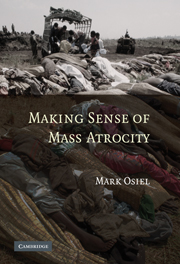Book contents
- Frontmatter
- Contents
- Dedication
- Preface
- Introduction
- 1 The Challenge of Prosecuting Mass Atrocity
- PART I LEGAL RULES AND THEIR PROBLEMS
- 2 The Responsibility of Superiors
- 3 Participating in a Criminal Enterprise
- 4 Defining the Criminal Enterprise
- 5 The Bureaucracy of Murder
- 6 Culpability, Character, and Context in Mass Atrocity
- PART II THE POLITICAL CONTEXT OF LEGAL CHOICE
- PART III NEW POSSIBILITIES AND SOLUTIONS
- Conclusion
- Index
- References
6 - Culpability, Character, and Context in Mass Atrocity
Published online by Cambridge University Press: 15 September 2009
- Frontmatter
- Contents
- Dedication
- Preface
- Introduction
- 1 The Challenge of Prosecuting Mass Atrocity
- PART I LEGAL RULES AND THEIR PROBLEMS
- 2 The Responsibility of Superiors
- 3 Participating in a Criminal Enterprise
- 4 Defining the Criminal Enterprise
- 5 The Bureaucracy of Murder
- 6 Culpability, Character, and Context in Mass Atrocity
- PART II THE POLITICAL CONTEXT OF LEGAL CHOICE
- PART III NEW POSSIBILITIES AND SOLUTIONS
- Conclusion
- Index
- References
Summary
Some have lambasted as profoundly “illiberal” the conceptual innovations recently employed by international courts, described in Chapters 2 through 5. The critics acknowledge that, without these doctrinal ingenuities, criminal law might never fully reach mass atrocity's masterminds. Yet, if liberal legality achieves this laudable goal only by compromising its first principles, then in the process it has surely lost its moral bearings, even sacrificed its soul. That is clearly too high a price to pay even for so seemingly unimpeachable a goal as ending impunity for genocide.
Such views, offered recently by Héctor Olásolo, Daryl Robinson and Yale Law professor Mirjan Damaška, may initially seem in striking contrast to Drumbl's, which condemns international criminal law for being too liberal, rather than insufficiently so. Drumbl's concern, the reader will recall, is that such law has been too individualistic in method and underlying moral theory to be fair to the lowest-echelon perpetrators of mass atrocity, considering the intense pressures for obedience to which they are often made subject by their sociopolitical context. Still, both sets of critics are clearly vexed by the same underlying question: can international criminal law hope to make much real sense of mass atrocity while remaining tethered to its philosophical basis in “liberalism,” as they understand it?
Their views are compatible, strictly speaking. Robinson condemns the illiberal character of legal doctrines deployed against the big fish, their alleged violation of the principle of individual culpability.
- Type
- Chapter
- Information
- Making Sense of Mass Atrocity , pp. 118 - 144Publisher: Cambridge University PressPrint publication year: 2009

